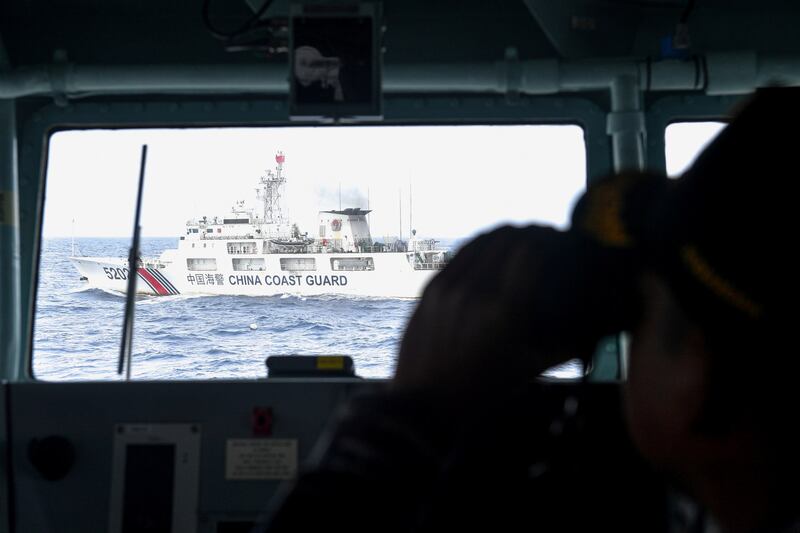As the Southeast Asian bloc struggles to forge a consensus on divisive issues like the South China Sea and Myanmar, analysts see a possible shift in how the region’s diplomats and officials go about their business.
Consensus-driven diplomacy, epitomized by the Association of Southeast Asian Nations (ASEAN), is in danger of being sidelined in favor of more flexible and nimble arrangements to address issues of regional concern.
International relations wonks have got a name for it: “minilateralism.”
Just this week, top leaders of Singapore and Indonesia signed a number of key documents paving the way for stronger bilateral cooperation including in the South China Sea.
Meanwhile, the defense ministers of Malaysia, Indonesia and the Philippines were also due this week to meet and discuss trilateral security cooperation, although those talks were postponed until March, reportedly because of Covid-19.
And Indonesia is planning talks with a small group of nations next month on maritime security.
Observers say the trend may signal a rethinking of ASEAN’s principle of consensus, when all the member states should agree and find a common stance on any subject.
Instead, they may look to form smaller, more informal and flexible groupings within the bloc in order to deal with pressing issues more effectively.
“Sadly minilateralism is probably the only way forward,” said Shahriman Lockman, a senior analyst at the Malaysian Institute of Strategic and International Studies (ISIS).

‘Foster brotherhood’
Differences with ASEAN have been on display in recent weeks over Cambodian Prime Minister Hun Sen maverick attempt to resolve the crisis in Myanmar. Last week he lashed out against his Malaysian counterpart for criticizing his dealings with the junta.
But probably the most enduring, divisive issue within ASEAN is the South China Sea, which has left nations without a stake in those disputed waters at odds with those that do.
In December, Indonesia invited officials in charge of maritime security from five other ASEAN members to meet to "share experiences and foster brotherhood" among the countries facing similar challenges posed by China there.
Head of the Maritime Security Agency (Bakamla) Vice Adm. Aan Kurnia said he’d invited counterparts from Brunei, Malaysia, the Philippines, Singapore and Vietnam to a meeting in February to discuss how to establish a coordinated approach in matters related to the South China Sea, and “how to respond in the field when we face the same ‘disturbance’.”
Huynh Tam Sang, a lecturer at Ho Chi Minh City University of Social Sciences and Humanities (USSH) in Vietnam, said: “ASEAN has tried its best to maintain a neutral stance when coming to the South China Sea issue.”
“But as ASEAN countries are all small- and middle-sized states, it is not easy [for them] to come up with a solid stance and effective strategy to navigate the South China Sea issue,” he said.
Shahriman from the Malaysian ISIS was more forthright:
“I think there is a growing frustration with the fact that ASEAN is unable to be more cohesive,” he said. “Minilateralism is inevitably seen as an option.”
“I don’t believe that minilateralism will be as damaging to ASEAN as some may think. For years, countries around the Mekong [river] have been working in their own mechanisms without raising existential questions about ASEAN,” Shahriman explained.
“So why should it be any different for the South China Sea?”
There have been precedents, including the Malacca Strait Patrol which involves several littoral states, and the Trilateral Cooperation Arrangement for the Sulu Sea, according to the Malaysian analyst.
“Unlike multilateral settings, minilateral ones tend to focus on narrower and more specific themes with exclusive membership, thereby proving more effective in solving issues that matter to those directly involved,” agreed Sang from Ho Chi Minh City USSH.
Experts say a grouping of like-minded countries focused on maritime security cooperation would work best to promote stability and prevent conflicts in the disputed waters.
Role of Bakamla
Beijing has been accused of harassing other countries when they are exploring resources in the South China Sea.
Indonesia, for example, has been repeatedly told by China to stop drilling for oil and gas near the Natuna islands as the block lies within the so-called “nine-dash line” that China uses to demarcate its expansive claims.
Sang said the situation in North Natuna Sea, as well as Beijing’s constant objections to Jakarta’s development projects, has challenged Indonesia’s stance that it’s a non-claimant in the South China Sea.
“Jakarta could no longer stay aloof from the South China Sea disputes,” he said, proposing that Indonesia, via its maritime security agency Bakamla, should take the lead in “navigating South China Sea challenges.”
Dedi Dinarto, a senior analyst at S. Rajaratnam School of International Studies in Singapore, concurred.
“I believe that this is a feasible arrangement for Bakamla to interact with the neighboring coast guards as Indonesia prefers to maintain a cooperative security approach when dealing with threats and instability in the region,” he said.
“Bakamla can initiate the minilateral white hulls forum as an initial step,” said Dedi, who specializes in Indonesia’s politics and maritime security.
But there are many hurdles to overcome before the neighbors can come up with a well-oiled working mechanism. Beijing, known for putting economic pressure on smaller regional states, will not let those actions go unnoticed, analysts said.
Domestic obstacles should also not be discounted, said Dedi.
“To sustain or even expand its role in the regional setting depends on its reputation at home and the willingness of the central government to place more resources for Bakamla and to set it as the key player compared to other maritime security agencies including the Navy,” he said.
Bakamla still has very modest operational assets, including just 10 coastguard vessels and minimal weaponry. Its “unclear institutional identity”, said Dedi, led to a limited acknowledgement at home and up to date, the agency remains dependent on the Navy for backup support.
“With these issues, it remains to be seen whether Bakamla can thrive and play a more significant role.”
